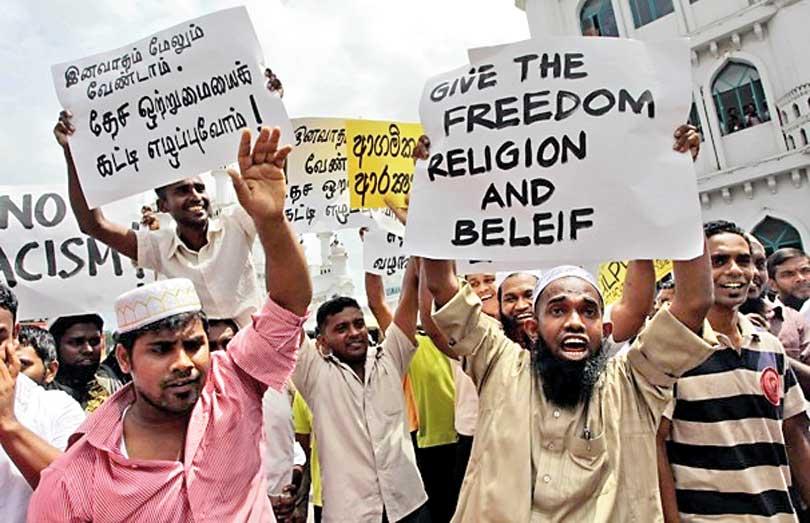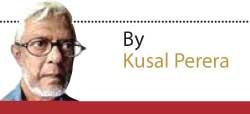Reply To:
Name - Reply Comment

 Presidential elections in January 2015 saw both Tamils and Muslims polling almost en bloc, perhaps for the first time in such a manner at any election. It was an open protest vote packed with anger against the Rajapaksa regime. So much so, women’s polling sections in and around Colombo had unimaginably long queues. Muslim ladies who may never have voted at an election in all their lives were queuing up to vote.
Presidential elections in January 2015 saw both Tamils and Muslims polling almost en bloc, perhaps for the first time in such a manner at any election. It was an open protest vote packed with anger against the Rajapaksa regime. So much so, women’s polling sections in and around Colombo had unimaginably long queues. Muslim ladies who may never have voted at an election in all their lives were queuing up to vote.
The sick and the elderly were seen wheeled to the polling stations. They were frustrated and were determined to vote out Rajapaksa.
Introduction to such determined political protest by Muslim people begins in 2013 January in the aftermath of BBS initiated “Anti-Halal” campaign.
These campaigns dragged the Muslim community in Sinhala South into total uncertainty. Their entire culture was challenged, they were accused as Jihadists, their Mosques were desecrated and attacked and so were their businesses. This anti-Muslim campaign exploded with fierce brutality in Aluthgama-Beruwala in June 2014.
In war-torn North and East, Tamils fared no better. Their demand for investigations into forced disappearances was ignored by the Rajapaksas.
Tamil youth in detention for long years without any charges filed against them were never released.
The military were in occupation of their lands, and were into businesses that hindered an economically viable civil life. Under intense surveillance, their right to association and freedom of expression as individuals and as a community was severely suppressed.
Large scale drug peddling caused many social conflicts and growing addiction among youth in the North. Politicians connected to the Rajapaksa regime were accused of drug trafficking.
All those injustices, discriminations and racial suppression rallied Tamil and Muslim votes against Rajapaksa.
It was more than a “protest” vote that helped this hybrid Yahapalana government to come to power. This government too openly betrayed the Tamil and Muslim people during the past 04 years. Muslim leaders who joined the UNP government on the strength of the Muslim vote and the TNA that unconditionally supported the government did not in anyway demand justice and fair play to their own people. All parties in government avoided intervening in any of the issues the Muslim people were being savagely targeted from Ampara to Digana. They avoided taking up the most disgraceful and inhuman victimisation of Dr.Shafi on an extremely open and violent anti-Muslim campaign ever, in post-independent Sri Lanka.
The Presidency of Sirisena and the UNP government took no public stand against organised racist attacks on Muslim people in the Kuliyapitiya – Minuwangoda area.
There were no protests and demands from Muslim political leaders for the immediate arrest of racist mobs under the ICCPR Act. Chairman of the HRC wrote to the Acting IGP, that the ICCPR Act should have been the law enforced against those arrested. Resignations of Muslim leaders from ministerial portfolios were shamelessly selfish.
Betrayal of the Tamil people by the ITAK leadership in the TNA is far worse. They called for the Tamil people to vote against Rajapaksa in 2015 January promising democratic space. In 2015 August they wanted Tamil people to vote TNA to parliament with maximum representation on the promise that they would solve all Tamil issues before end December 2016. The ITAK leadership was politically more than mediocre. They could not read how this UNP government would react to Sinhala Buddhist extremist campaigns.
The ITAK leadership believed in a New Constitution for a political solution as promised by this Wickremesinghe government. But this pickle of a government did not want to drop Sinhala Buddhist demands for a “Unitary State” with Buddhism given Constitutional privilege. The ITAK leadership thought they are clever enough to smuggle provisions into the draft as they wished when the whole Constitution has to be openly debated in public at a People’s Referendum.
Sri Lanka would end up caught deep in a geopolitical conflict between the two economic giants with a heavily polarised society that props up a Sinhala Buddhist “Theocratic State” legitimised by voting for the crudest of all Sinhala Buddhist candidates.
They were dealing with the most rabidly racist Sinhala political party in post-independent Sri Lanka. The UNP government of D.S. Senanayake began by de-franchising and de-citizenising the entire upcountry Tamil labour in 1948. Back to power in July 1977, the Jayewardene government oversaw 02 violent anti-Tamil riots, one in 1977 August killing many dozens of Tamil people and then in Jaffna in 1980 that left the prestigious Jaffna library burnt, the Eelanadu press damaged and its employees attacked, Jaffna MP V. Yogeswaran’s residence and TULF headquarters attacked and the whole Jaffna city looted, supervised by two leading cabinet ministers of Jayewardene’s government.
The ITAK pinned their faith in the UNP leadership that organised and orchestrated the bloodiest pogrom on Tamil people in July 1983. Sinhala racist indoctrination of the UNP is spelt out best by President Jayewardene himself. Two weeks before the’83 July massacres, in an interview with the “London Daily Telegraph” on 11 July 1983, President Jayewardene told Ian Ward, “… I am not worried about the opinion of the Jaffna people now… Now we cannot think of them. Not about their lives or of their opinion about us… The more you put pressure in the north, the happier the Sinhala people will be here… really, if I starve the Tamils out, the Sinhala people will be happy…”
It is with this UNP and its present leader then a cabinet minister of the Jayewardene government the ITAK leadership believed they could have all Tamil problems solved. The ITAK leadership did not have patience and the intellect to read the evolving political scenario where all mainstream political parties were openly competing for Sinhala Buddhist votes and extremist Sinhala Buddhist groups went about with State patronage.
They did not want to accept they were on the wrong path when they could not even have detained Tamil youth released who had no charges filed against them. When they failed to have the government act, they unconditionally supported to honour its own co-sponsored UN Resolution 30/1 that by now is a forgotten affair.
During the past four years, this hybrid Yahapalana government with their own breed of Sinhala Buddhist politics had effectively pushed Tamil and Muslim people out of national politics. The disappointment and frustration instilled in Tamil and Muslim people by this UNP government effectively removed them from national politics. For the first time in Tamil and Muslim communities, the larger majority would not accept this election as their responsibility to elect a president. Though their political leaderships would still workout “political deals” to be ministers in government, in plain language, Tamil and Muslim leaders cannot lead their own constituencies anymore now.
It is evident therefore the percentage of Tamil and Muslim votes would drastically drop in this coming Presidential Election. In January 2015 while 81.5 per cent voted, 07 months later in August the percentage polled dropped to 77.7 per cent.
This coming November, with both mainstream parties playing for Sinhala Buddhist extremism fuelling and fermenting more disappointment, frustration, resentment and anger in Tamil and Muslim communities, the voting percentage could drop to below 70 per cent. That drop will be mainly from the 6.2 million (51.3 per cent) who voted against Rajapaksa.
Yet, Rajapaksa polled 5.7 million (47.6 per cent). Almost all Sinhala Buddhist votes. At this Presidential Election, whoever the UNP candidate will have to regain the 6.2 million anti-Rajapaksa votes to ensure his (no ‘her’ in the running) victory. If half of 256,586 in Batticoloa, 340,751 in Jaffna, 195,356 in Trincomalee and 180,225 in the Vanni alone that voted against Rajapaksa in 2015 January refrain from voting this time, UNP and its “Front” would be left with 6.2 million less 486,459 votes; that is with 5.7 million votes. It is not only the Muslim East that would not poll as in 2015. A large number of Muslim people in the Sinhala South would also refrain from voting, or would vote for “nonentities” in protest. That would leave the UNP candidate with less than 05 million votes as against the 5.8 million polled by Rajapaksa in 2015 January.
What is also important today is that the “Sinhala Catholic” vote would also split in favour of the Rajapaksa candidate. Majority of the Catholic community outside Westernised urban life are “naturalised” Sinhala Buddhists. “Culturally” they behave very much as ordinary “Sinhala Buddhists” and are in line with Cardinal Malcolm Ranjith who concedes Sri Lanka to be the country of the “Sinhala Buddhists”. That would also reduce the UNP vote by a fair percentage.
If the voting percentage drops to around 70 per cent, the winning candidate will have to poll one more than half of 10.8 million votes that counts around 5.4 million.
Chances of a UNP candidate retaining that number from the 6.2 million that voted against Rajapaksa in January 2015 is near impossible today with especially Tamil and Muslim votes dropping out in large numbers. What is possible is for the Rajapaksa campaign to bundle together more Sinhala Buddhist votes with the anti-Muslim hype already on the streets in favour of a “strong” Sinhala Buddhist President.
In a country where the urban educated, the professional and the affluent don’t demand answers for any of the serious social issues but opt for a “strong” Sinhala Buddhist leader, the Rajapaksa family with their SLPP nominee would deliver to their taste.
That would also have US endorsement for the sake of the SOFA they are seriously working towards in countering Chinese influence. To sum up, in one simple sentence, Sri Lanka would end up caught deep in a geopolitical conflict between the two economic giants with a heavily polarised society that props up a Sinhala Buddhist “Theocratic State” legitimised by voting for the crudest of all Sinhala Buddhist candidates.